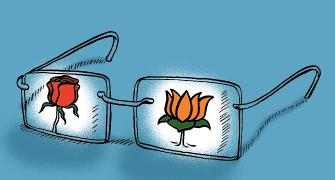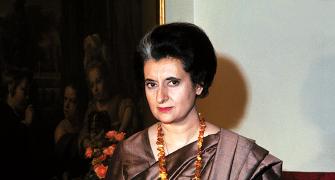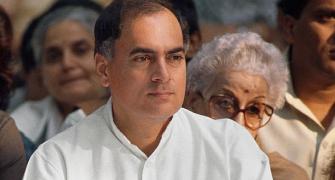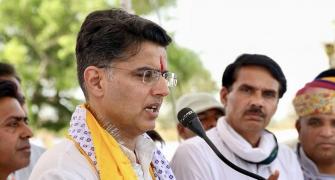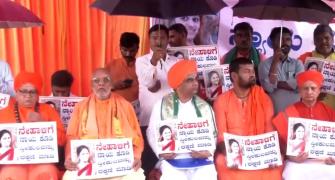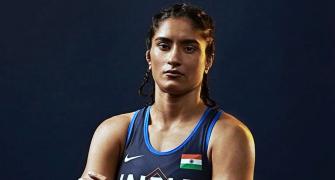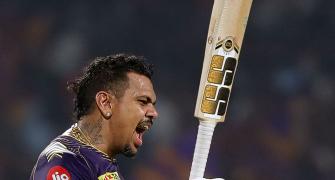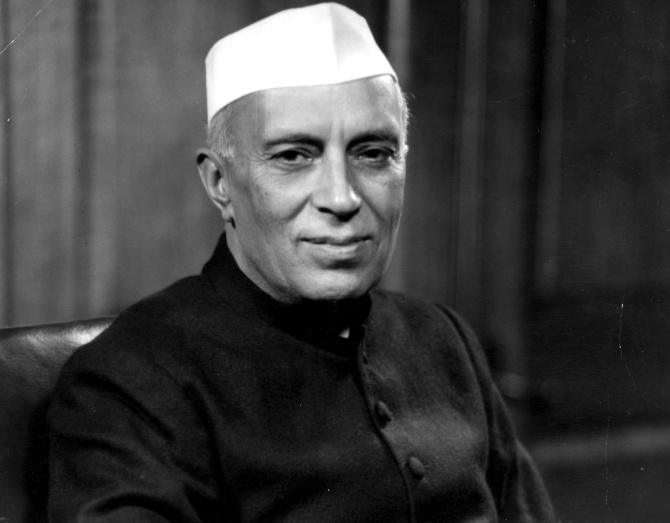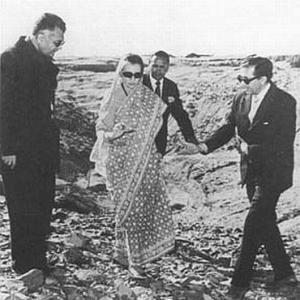'They were the leaders of my country and the children of Mother India, but they didn't die as martyrs.'
'They were killed, most unfortunately, by a well planned enemy plot, and they were victims of political violence,' states Sudhir Bisht.
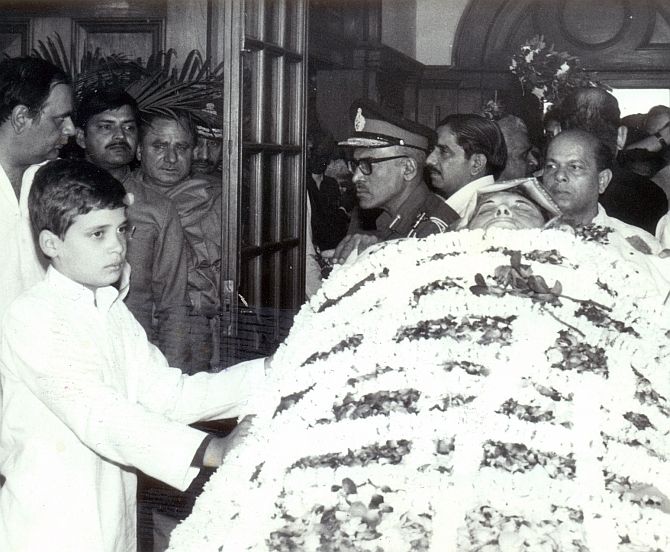
Prime Minister Narendra Damodardas Modi, fed up of the nicely orchestrated campaign of 'Chowkidar chor hai' gave back to the Nehru-Gandhi family with all the might at his disposal and then some.
He called Rahul Gandhi's late father, former prime minister Rajiv Gandhi, as someone who would be remembered as one of the most corrupt people of all time.
Immediately, the Congress was up in arms against Modi. While Rahul Gandhi reminded Modi of the theory of karma, the television channels that are Nehru Parivar bhakts said it was appalling to speak ill of the dead.
Interestingly, even NDTV didn't say once that Rajiv Gandhi didn't have a taint of corruption in his short-lived political career.
Rajiv's daughter Priyanka Vadra and many other Congressmen were quick to point out that the Nehru-Gandhi family had made supreme sacrifices for India and it was monstrous to speak ill of the martyrs.
Personally, I have no love lost for the Nehru-Gandhi family, but there are only two occasions when I have experienced an inexplicable, colossal, sense of anger and sorrow at the passing away of politicians of India.
The first time was in 1984 when Indira Gandhi was felled by the bullets of her bodyguards, and the second time in 1991, when Rajiv Gandhi met an unfortunate end in Sriperumbudur at the hands of the Liberation Tigers of Tamil Eelam.
Although I never admired either Indira or Rajiv, I felt angry and sad that my country's leaders were killed by the enemies of the State.
However, I will never call Indiraji or Rajiv Gandhi martyrs. They were the leaders of my country and the children of Mother India, but they didn't die as martyrs. They were killed, most unfortunately, by a well planned enemy plot, and they were victims of political violence.
My heart aches for them, but they were sufferers and not martyrs.
So who qualifies to be a martyr?
One of the earliest martyrs was Abhimanyu, the young son of Arjun and Subhadra who died a valiant death in the Chakravyuh battle arrangement of the Kaurava army. Abhimanyu is the most valiant of all heroes in the battle of the Mahabharat.
One of the greatest warriors and teachers of the Mahabharat, Dronacharya, was also killed in the war. But he was beheaded by the brother of Draupadi, Dhrishtadyumna (the Panchala prince) when Dronacharya was unarmed and in a state of grief at the perceived loss of his son's life.
Dronacharya didn't die a martyr's death. He didn't die fighting, but he died while he was grieving.
A person achieves martyrdom if he or she is killed or made to suffer greatly because of her/his political or religious beliefs. In the case of a martyr, he/she is mostly up against the mighty State that is tyrannical, dictatorial, authoritarian and iniquitous.
Indiraji was killed by her bodyguards, the men who ironically were supposed to guard her. Even though she was advised to remove the Sikh bodyguards, she insisted on having them as she never believed that her most trusted bodyguards could kill her.
She died a gory death, but she wasn't martyred as she didn't die in any battle or war action. It was not as if she knew that she could be killed and yet she ventured to fight and fall in the battlefield.
Rajiv Gandhi too fell to the evil designs of a very determined, very motivated, and very deadly organisation that held much hatred against him. The LTTE felt Rajiv Gandhi had tried to finish it off and wanted to take revenge.
Writers of contemporary history will be forever divided on the merits of Rajiv's direct engagement in the internal, bloody politics of Sri Lanka.
Rajiv died a grisly death and his killing was a body blow to India's morale and prestige, but his end was not something akin to laying down one's life for the country.
Indiraji and Rajiv were killed by mad zealots just as John F Kennedy was assassinated in 1963 by a crazy man called Lee Harvey Oswald. Politics is a risky business, and many a ruler in the Indian subcontinent has been killed by hotheads.
In Pakistan Zulfikar Ali Bhutto was hanged in 1979 and his daughter Benazir was assassinated in 2007.
In Bangladesh, Sheikh Mujibur Rahman and Zia-ur Rahman were assassinated.
Ranasinghe Premadasa, president of Sri Lanka, was assassinated in 1993.
In India, Lalit Narayan Mishra was killed in a bomb blast in January 1975 at Samastipur railway station.
Lalit Maken was gunned down in 1985 by Harjinder Singh Jinda, Sukhdev Singh Sukha and Ranjit Singh for his alleged involvement in the 1984 anti-Sikh riots.
Jan Sangh founder Dr Syama Prasad Mookerjee died in solitary confinement in his fight against the restriction of free movement of non-Kashmiri Indians in Jammu and Kashmir.
The point that I am trying to make is that Indiraji and Rajiv Gandhi died under extremely regrettable circumstances, but to call their unfortunate end an act of martyrdom is needless glorification.
Since Congress leaders always talk about the sacrifices made by the Nehru-Gandhi parivar, let me also examine in detail the lives of members of this family from Motilal Nehru downwards.
Motilalji was a lawyer -- some say he was just a pleader -- and an immensely wealthy man.
His son Jawaharlal was a great leader, but not the greatest in his initial days. He was easily overshadowed by more illustrious men like Subhas Chandra Bose and Vallabhbhai Patel, but due to the enormous patronage Nehru received from Mahatma Gandhi, he succeeded in becoming prime minister of India.
All in all, Nehru, a man of limited achievement either as lawyer or freedom fighter, lived a life of being the favourite and the favoured son of Mother India.
From the anonymity of being just another lawyer in Allahabad, Motilal was propelled to the post of Congress president, and his son was crowned as the prime minister, bypassing many other meritorious men of his age.
I personally believe Motilal and his son received far more from India than what they gave to India.
Indira Gandhi, Jawaharlal Nehru's daughter, ruled India with an iron hand and a clenched fist for 15 years. Apart from bank nationalisation and the liberation of Bangladesh, she also imposed a state of Emergency in June 1975.
Indira Gandhi also enjoyed all the luxuries associated with being the prime minister's daughter and being the prime minister herself.
She did whatever she deemed fit and it rubbed on to her younger son who ran a massively unpopular sterilisation programme without holding any position in the government.
Rajiv Gandhi too led a charmed life, all thanks to being his mother's son. He walked out of the cockpit to the chair of prime minister without any opposition. No doubt, Rajiv had a great run from 1984 to 1989 as prime minister.
Sonia Gandhi, the present inheritor of the Nehru dynasty, too enjoyed a bull run from 1999 to 2014 as the unchallenged leader of the Congress party.
From 2004 to 2014, she ran the UPA government from the backseat and this period also coincided with the increasing business fortunes of her son-in-law's real estate empire.
Even between 1998 and 2004, when Atal Bihari Vajpayee was prime minister, Sonia Gandhi didn't have an uneasy time. Lal Kishenchand Advaniji, the then home minister, clasped his hands and bowed a little whenever he met Soniaji in the corridors of power.
The latest middle-aged generation of the Nehru Gandhi parivar, represented by the now improved Rahul Gandhi and now exposed Priyanka Vadra, continue to enjoy being the ultimate power-centre of India's oldest political party.
I wish the family all the best, but my case is that the nation has given the family infinitely more than what they have given to the nation.
To me martyrdom or to be a shahid is too sacred a word to be used liberally.
Chandra Shekhar Azad was just 24 when he died fighting the British-India police at Alfred Park in 1931. Bhagat Singh and Sukhdev were just 23 and Rajguru 22 when they were hanged by the British in 1931.
And lest we forget, Khudiram Bose was just 18 when he was hanged in 1908.
India has this tradition of an 18-year-old Khudiram Bose who smiled when he was sentenced to death. I read in India Today some months ago that when Khudiram Bose was asked to say something after the death sentence was pronounced on him, he said if he was given some more time, he could teach the judge the skill of bomb-making!
Martyrs die for a cause but not for any rewards. This is what martyrdom is all about.
Sudhir Bisht, PhD, author and freelance columnist, tweets at @sudhir_bisht

